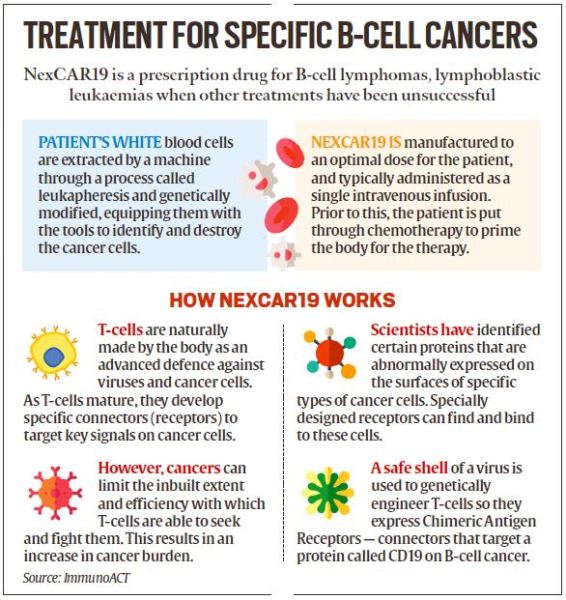India’s own CAR-T cell therapy
Context
- The Central Drugs Standard Control Organisation (CDSCO) has granted market authorisation for NexCAR19, India’s first indigenously-developed CAR-T cell therapy.
- This paves the way for the commercial launch of this therapy in India, where it is expected to be available to cancer patients at a tenth of the cost abroad.

How effective and different is this from other cancer treatments?
- While chemotherapy and immunotherapy may add a few months or years to a cancer patient’s life, cell-and-gene therapy is designed to cure and provide lifelong benefit.
- It makes treatment easier with a one-time therapy unlike several sessions of chemotherapy that can be truly transformative for a patient. It’s a lifeline for non-responsive cancer patients.
Is NexCAR19 a type of CAR-T therapy?
- NexCar19 is a type of CAR-T and gene therapy developed indigenously in India by ImmunoACT, which is a company incubated at IIT Bombay.
- This therapy is designed to target cancer cells that carry the CD19 protein. This protein acts like a flag on cancer cells, which allows CAR-T cells to recognise and attach themselves to the cancer cells and start the process of elimination.
- Even some developed nations don’t have their own CAR-T therapies; they import them from the United States or Europe. India is now one of the first developing countries to have its indigenous CAR-T and gene therapy platform.
Efficacy of India’s indigenous CAR-T cell therapy
- Laboratory and animal studies have shown a unique quality of this product. Specifically, it leads to significantly lower drug-related toxicities. It causes minimal damage to neurons and the central nervous system, a condition known as neurotoxicity.
- Neurotoxicity can sometimes occur when CAR-T cells recognise the CD19 protein and enter the brain, potentially leading to life-threatening situations.
- The therapy also results in minimal Cytokine Release Syndrome (CRS), which is characterised by inflammation and hyperinflammation in the body due to the death of a significant number of tumour cells, as CAR-T cells are designed to target and eliminate cancer cells.
- You can think of this like how the body responds to a virus such as SARS-CoV-2, where the immune response triggers an influx of certain proteins called cytokines, causing a lot of inflammation.
Subscribe
Login
0 Comments
